17 Jun2022
By AZEdNews
 The Arizona Teacher Residency has accepted its first cohort of 30 future teachers, as well as the 30 supervising teachers who will be working with those teacher residents this next school year.
The Arizona Teacher Residency has accepted its first cohort of 30 future teachers, as well as the 30 supervising teachers who will be working with those teacher residents this next school year.
The Arizona Teacher Residency is a first-of-its-kind graduate program in Arizona modeled after medical residencies to help recruit, prepare, support and retain K-12 teachers, especially those with identities that have been underrepresented in the teaching population. The two-year program provides aspiring teachers with in-classroom experience, a living stipend, a master’s degree and a job at a partnering school district. Residents will receive mentoring and induction from a trained instructional mentor through the Arizona K12 Center in their second year with the support continuing into the third year.
17 Jun2022
$2 Million Will Be Dispersed to Educator Preparation Programs Over the Next Two Years
By David Bednarz and Eric Scoville

Governor Ned Lamont and Connecticut Education Commissioner Charlene Russell-Tucker today announced new investments to defray certification-related testing costs for aspiring educators in Connecticut.
A total of $2 million dollars of federal, state-level reserve American Rescue Plan Act, Elementary and Secondary School Emergency Relief (ARP-ESSER) funding is being dedicated over a two-year period, which includes $750,000 in year one and $750,000 in year two. The remaining $500,000 is being set aside for educators of color and other educators who will be completing their student teaching in urban school districts.
14 Jun2022
By Michael Rose and Jacqueline Rodriguez
On June 9, Department of Education Secretary Miguel Cardona released a vision to support and elevate the teaching profession. AACTE applauds the vision to recruit, develop, and retain future educators in a time when extreme educator shortages are afflicting the country, and looks forward to working with the secretary to realize each strategy. The secretary’s vision, announced during a fireside chat at AACTE member institution, Bank Street College of New York, arrived on the heels of AACTE’s premier advocacy event, Washington Week, as AACTE members and its state affiliates met with their federal legislators to promote comprehensive educator preparation.
13 Jun2022
By Kaitlyn Brennan
 This weekly Washington Update is intended to keep members informed on Capitol Hill activities impacting the educator preparation community. The views expressed in this post do not necessarily reflect the views of AACTE.
This weekly Washington Update is intended to keep members informed on Capitol Hill activities impacting the educator preparation community. The views expressed in this post do not necessarily reflect the views of AACTE.
This week Congress is back in session and we have learned that the House has set the schedule for marking up FY2023 bills this month. Reports signal that on June 22, the House will approve the 12 subcommittee allocations, meaning they will set the mark for the total amount each subcommittee will have to work from. On June 30, starting at 10 a.m. EST the Committee will mark up the Labor-HHS-Education bill. It is sure to be a busy summer as advocates continue to urge Members to make significant investments in education- specifically investments targeted to address the critical shortage of educators and specialized instructional support personnel across the nation.
08 Jun2022
By AACTE
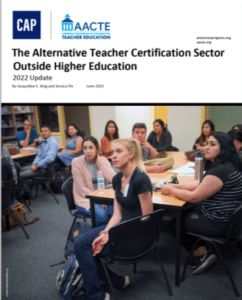 The Center for American Progress (CAP) and the American Association of Colleges for Teacher Education (AACTE) today released The Alternative Teacher Certification Sector Outside Higher Education. The report, which builds upon CAP’s 2020 study of this sector, updates and extends the analysis to include more recent student data and a historical look at patterns in the teacher preparation program landscape.
The Center for American Progress (CAP) and the American Association of Colleges for Teacher Education (AACTE) today released The Alternative Teacher Certification Sector Outside Higher Education. The report, which builds upon CAP’s 2020 study of this sector, updates and extends the analysis to include more recent student data and a historical look at patterns in the teacher preparation program landscape.
In response to the teacher shortage, some states allow non-traditional models for preparing teachers, including alternative certification programs run by organizations other than colleges and universities. According to the report authors Jacqueline King, senior consultant to AACTE, and Jessica Yin, former policy analyst for the K-12 Education Team at CAP, The Alternative Teacher Certification Sector Outside Higher Education provides information for policymakers, education researchers, and leaders in educator preparation seeking to better understand this sector and identify necessary legislation, regulations, or opportunities for additional research. It tracks enrollment and completion trends in this sector over the last decade, with particular attention to fast-growing programs run by for-profit companies that account for nearly 70 percent of all students enrolled in the sector as of academic year 2018-19.
07 Jun2022
By Jacqueline Rodriguez
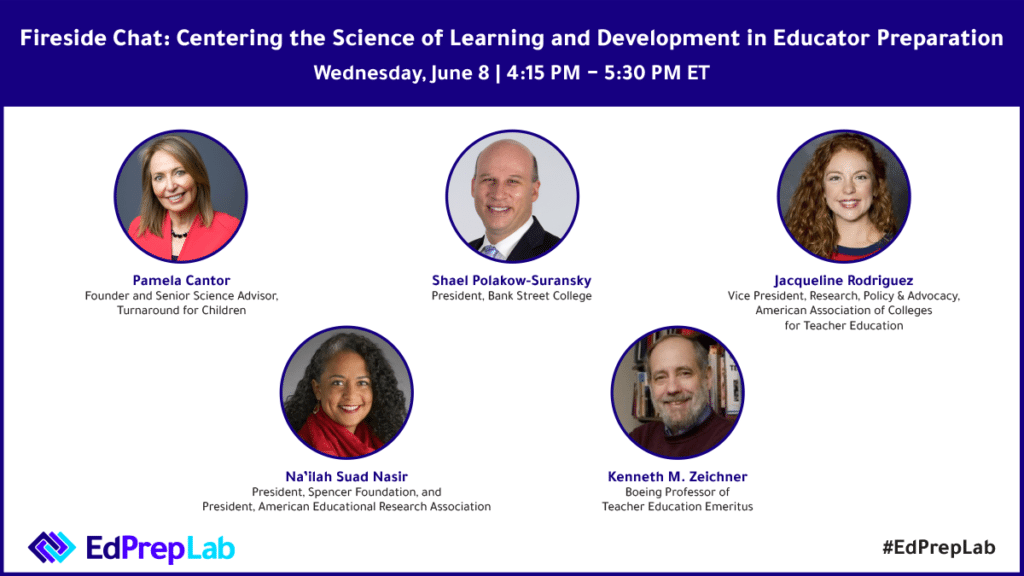
On June 8, the EdPrepLab, a collaboration between the Learning Policy Institute and Bankstreet College, will host its annual Spring Convening. Registration closes Tuesday, June 7.
Speakers will discuss research on new design principles for educator preparation based on the science of learning and development. We will kick off the discussion with a keynote address by Pamela Cantor, MD, founder and senior science advisor of Turnaround for Children, on the importance of using the science of learning and development to design learning environments for PK–12 students. We will then turn to a conversation about how EdPrepLab is using the science of learning and development to craft principles for the preparation of teachers and leaders. These principles will sharpen EdPrepLab’s focus on the structures and practices educator preparation programs need to enact in order to prepare teachers and leaders focused on deeper learning and equity. Speakers will discuss the critical role these principles should play in designing preparation programs that develop the educators all our students need and deserve.
07 Jun2022
By Matthew Wales
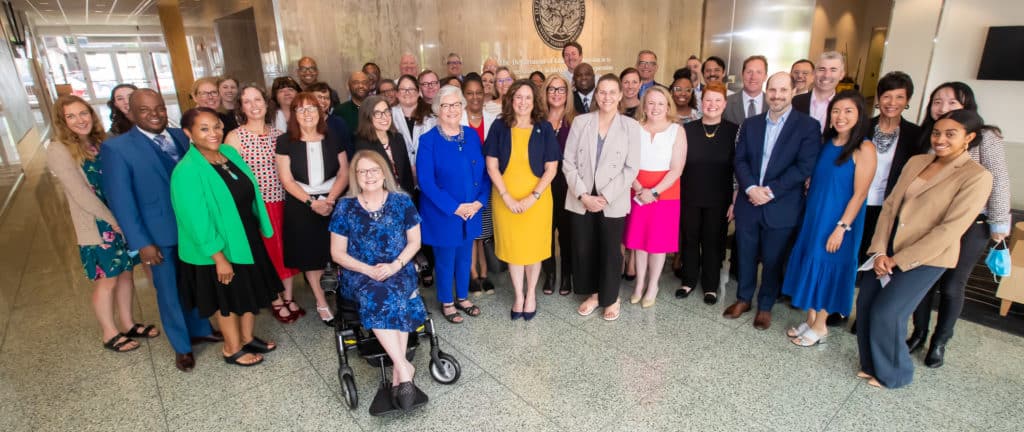
Today, representatives from several AACTE member institutions, along with AACTE staff, representatives from both the Council for the Accreditation of Educator Preparation (CAEP) and the Association for Advancing Quality in Educator Preparation (AAQEP), and colleagues from the International Society for Technology in Education (ISTE) and the Society for Information Technology and Teacher Education (SITE), committed to leveraging their resources to support the adoption of the EPP Digital Equity and Transformation Pledge.
In a signing ceremony at the U.S. Department of Education with Deputy Secretary Cindy Marten, the following AACTE members, on behalf of their respective institutions, committed their educator preparation programs to expanding and scaling digital equity and transformation in learning:
26 May2022
By Eric Gorton
26 May2022
By SFA News
 Stephen F. Austin State University’s James I. Perkins College of Education has partnered with the Nacogdoches Independent School District to staff up to eight paid internships during the 2022-23 academic year.
Stephen F. Austin State University’s James I. Perkins College of Education has partnered with the Nacogdoches Independent School District to staff up to eight paid internships during the 2022-23 academic year.
The program, which launches this fall, will let students use clinical teaching assignments to gain valuable classroom experience before entering the education workforce.
Implementation of the new program is meant to ensure that the educational field is keeping pace with others, said Gabriel Trujillo, NISD superintendent.
17 May2022
By Meghan Grenda
 The Co-Teaching in Clinical Practice Topical Action Group (TAG) is hosting their end of year virtual chat for all AACTE members and you are invited to join.
The Co-Teaching in Clinical Practice Topical Action Group (TAG) is hosting their end of year virtual chat for all AACTE members and you are invited to join.
What: Co-Teaching in Clinical Practice Topical Action Group
When: Wednesday, May 18
Time: 8:00 p.m. EST / 5:00 p.m. PST
Registration Information:
- Meeting ID: 834 1795 8707
- Password: COTEACH
AACTE’s TAGs are action-oriented working groups that focus on areas such as accreditation, historically Black colleges and universities (HBCUs), elementary education, research in teacher preparation, international education, and women in leadership, just to name a few.
To view the full the list of the 20 TAGs visit: aacte.org and join the TAG community on aacteconnect360.org.
If you have any questions please reach out to me at mgrenda@aacte.org.
10 May2022
By Allison Little
The 100Kin10 Project Team is seeking applicants to serve as faculty interested in implementing a re-imagined Intro to Education Course through a racial equity and social justice lens.
The Project Team is interested in exploring how the course can be used as a recruitment tool to diversify the teacher workforce by centering racial equity and social justice in the course content. With support through 100Kin10, the Redesigning Introduction to Education Project Team is looking to work with five faculty who can teach this course during the Fall 2022 semester and participate in a community of practice to inform the work and foster discourse around its impact on students. Faculty participants will receive $5,000 as compensation for their efforts.
For more information, visit RedesigningIntrotoEd. The application deadline is June 1, 2022.
26 Apr2022
By Kelly Meyer
The AACTE Co-Teaching in Clinical Practice Topical Action Group (TAG) held our annual business meeting during the AACTE 74th Annual Meeting in New Orleans in March. Among food and new friends, we elected new officers, reviewed the past year of work, and shared current themes in co-teaching. Amber Bechard, University of La Verne, is continuing as co-chair and I will continue as secretary (Kelly Meyer of University of Minnesota-Twin Cities). Newly elected as co-chair is Wendy Murawski, California State University-Northridge. We are still seeking a treasurer for this TAG.
18 Apr2022
By Carolyn Phenicie
AACTE congratulates Kurt Russell, an alumnus of AACTE member institution the College of Wooster.
 The Council of Chief State School Officers (CCSSO) today announced that Kurt Russell, a veteran high school history teacher, is the 2022 National Teacher of the Year.
The Council of Chief State School Officers (CCSSO) today announced that Kurt Russell, a veteran high school history teacher, is the 2022 National Teacher of the Year.
Russell, currently in his 25th year in the classroom, teaches at Oberlin High School in Oberlin, Ohio, where he was born and raised. Inspired to become an educator by his first Black male teacher, Russell works to emphasize cultural relevance and diverse representation in the curriculum of classes he teaches, including African American history; U.S. history; International Baccalaureate History of the Americas; and Race, Gender and Oppression.
Russell is also the school’s head varsity basketball coach. He sees basketball as an extension of the classroom and a place to teach life lessons on adversity and success. Additionally, Russell is the faculty advisor to a student-led Black Student Union, whose work has led to positive impacts for students across racial groups.
11 Apr2022
By Dian Dong
Prior to the COVID-19 pandemic, teacher preparation programs, as well as key stakeholders such as states, accreditation bodies, and teacher unions and organizations, were grappling with shifting demands on teachers and consequently on teacher education. The pandemic has led to deepening staffing shortages exacerbating the needs of PK-12 schools and thus placing increased pressures on teacher preparation programs (TPPs) to creatively address the needs. As TPPs and stakeholders seek to address quality teacher preparation in these changing times, it is critical to understand the landscape of TPPs, teacher candidates, and TPP evaluation systems. The National Academy of Education (NAEd) just released two commissioned papers that specifically target these questions.
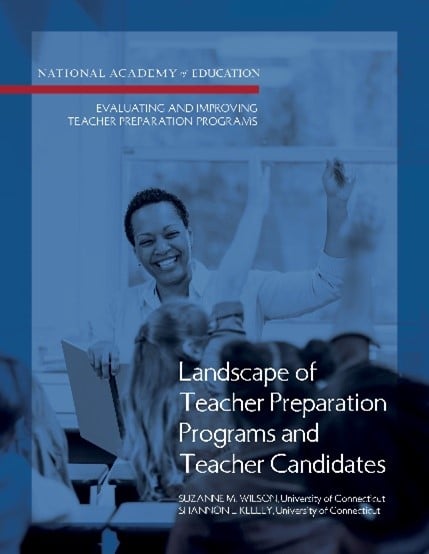 In Landscape of Teacher Preparation Program and Teacher Candidates, the authors Suzanne Wilson and Shannon Kelley discuss the contemporary teacher preparation landscape and the teacher candidates attending those programs. After providing an overview of the changing landscape of TPPs in the past three decades, the authors describe what is known about the teacher candidates who attend TPPs, including their demographics, academic ability, and motivations to teach. Given the need to attract new teachers, the authors offer a comprehensive synthesis of programmatic and policy approaches to recruiting and retaining new teacher candidates. The paper concludes with implications for policymakers, educators, teacher educators, and researchers as we face potential teacher shortages in the coming years.
In Landscape of Teacher Preparation Program and Teacher Candidates, the authors Suzanne Wilson and Shannon Kelley discuss the contemporary teacher preparation landscape and the teacher candidates attending those programs. After providing an overview of the changing landscape of TPPs in the past three decades, the authors describe what is known about the teacher candidates who attend TPPs, including their demographics, academic ability, and motivations to teach. Given the need to attract new teachers, the authors offer a comprehensive synthesis of programmatic and policy approaches to recruiting and retaining new teacher candidates. The paper concludes with implications for policymakers, educators, teacher educators, and researchers as we face potential teacher shortages in the coming years.
04 Apr2022
By Weade James
 AACTE in partnership with the University of Florida Literacy Institute (UFLI) invites faculty and in-service teachers to share their experiences relating to literacy development and effective reading instruction. In 2019, 35% of grade 4 and 34% of grade 8 students scored at or above proficient on the National Assessment of Educational Progress (NAEP), a decline since 2017. The longstanding reading achievement gap has been further exacerbated by the COVID-19 pandemic, leading to a growing number of states sounding the alarm on solutions to increase literacy development and reading proficiency in students.
AACTE in partnership with the University of Florida Literacy Institute (UFLI) invites faculty and in-service teachers to share their experiences relating to literacy development and effective reading instruction. In 2019, 35% of grade 4 and 34% of grade 8 students scored at or above proficient on the National Assessment of Educational Progress (NAEP), a decline since 2017. The longstanding reading achievement gap has been further exacerbated by the COVID-19 pandemic, leading to a growing number of states sounding the alarm on solutions to increase literacy development and reading proficiency in students.
 The Arizona Teacher Residency has accepted its first cohort of 30 future teachers, as well as the 30 supervising teachers who will be working with those teacher residents this next school year.
The Arizona Teacher Residency has accepted its first cohort of 30 future teachers, as well as the 30 supervising teachers who will be working with those teacher residents this next school year.











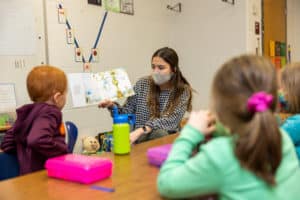

 The
The  The Council of Chief State School Officers (CCSSO) today announced that Kurt Russell, a veteran high school history teacher, is the 2022 National Teacher of the Year.
The Council of Chief State School Officers (CCSSO) today announced that Kurt Russell, a veteran high school history teacher, is the 2022 National Teacher of the Year. In
In  AACTE in partnership with the University of Florida Literacy Institute (UFLI) invites faculty and in-service teachers to share their experiences relating to literacy development and effective reading instruction. In 2019, 35% of grade 4 and 34% of grade 8 students scored at or above proficient on the National Assessment of Educational Progress (NAEP), a decline since 2017. The longstanding reading achievement gap has been further exacerbated by the COVID-19 pandemic, leading to a growing number of states sounding the alarm on solutions to increase literacy development and reading proficiency in students.
AACTE in partnership with the University of Florida Literacy Institute (UFLI) invites faculty and in-service teachers to share their experiences relating to literacy development and effective reading instruction. In 2019, 35% of grade 4 and 34% of grade 8 students scored at or above proficient on the National Assessment of Educational Progress (NAEP), a decline since 2017. The longstanding reading achievement gap has been further exacerbated by the COVID-19 pandemic, leading to a growing number of states sounding the alarm on solutions to increase literacy development and reading proficiency in students.